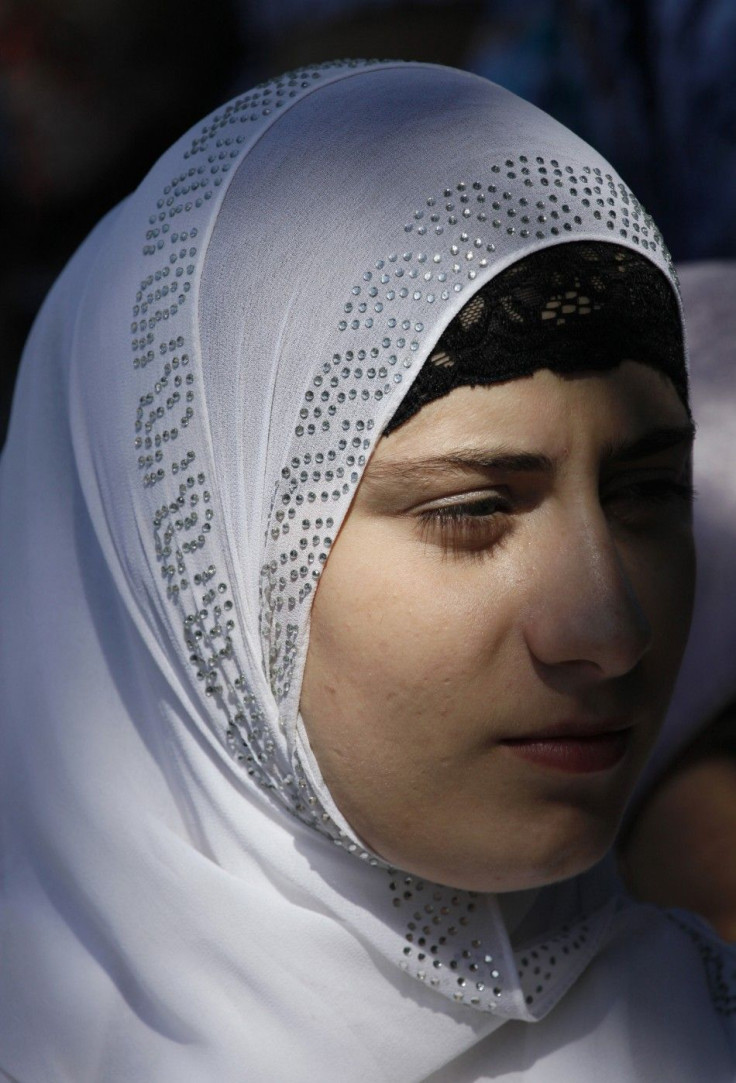Egypt: Female State TV Host Wears Headscarf On Air For First Time

A female news presenter appeared on the Egyptian state television wearing a headscarf Sunday for the first time since an unwritten ban on women covering their head during telecast was lifted after the Muslim Brotherhood-led government took charge.
Though Egypt's private satellite channels have sometimes permitted headscarves for women anchors, state-run television had strictly adhered to the unofficial rule against anchors sporting religious markers since its beginning in 1960 and later under the secular mandate of former President Hosni Mubarak's regime.
The anchor, Fatma Nabil, wearing a cream-colored scarf that covered her hair and neck, presented mid-day news bulletin on Channel 1, a state-run television station, media reports said.
Nabil worked for a year in the Muslim Brotherhood television network Misr 25 after the state television barred her from presenting news wearing hijab, the Associated Press reported. The presenter later told the BBC: "At last the revolution has reached state television."
The move has sparked heated debates across the country, where human rights activists criticize the ban on female news presenters from wearing hijab as an infringement on personal freedom, especially when nearly 70 percent of the Egyptian women cover their heads in public.
"After the Islamic movement came to power, a number of women - wearing headscarves and the full face veil - have sprung to prominence, most notably President Mohammed Morsi's wife," Egyptian feminist writer and activist Nawal el-Saadawi wrote in an article on the "Injustice from the left and the right for Egyptian women" published on Al-Hayat and translated to English by Al-Monitor .
"However, none of these women are taking a stand for women's rights, which have increasingly deteriorated in the name of religion and Islamic law. Furthermore, these women have reiterated the stance of the dominant political currents, saying that female circumcision and the veil are an intrinsic part of Egyptian Muslim women's identity. They attack those who fight for women's liberation, accusing them of blasphemy or national treason, or at the very least saying that they have adopted the inferior morals of Western women," she wrote.
An Egyptian court in Alexandria ruled in January that female state television hosts had the right to choose whether or not to wear a veil, saying that it did not "stand between the woman and her work and does not pose any obstacles for the working women," but rather "conserves her dignity."
The administrative court ruling was against Egypt's Ministry of Information which lost its legal fight against a female anchor from Alexandria, Lamiyaa al-Sayed, who sued the Minister for Information for not allowing her to appear on television wearing a veil in a 2008 incident. The court had also fined the then minister 20,000 Egyptian pounds for denying al-Sayed her right to wear a veil.
"Hijab banning is an issue of personal and religious freedom and that is why the decision will be revoked and the plaintiff will be compensated for all financial and psychological damages she endured," the court had said in the ruling.
It was then reported that the court ruling ended decades of disagreement between female anchors and the Ministry of Information during which women were fired for protesting for the right to appear on television covering their head.
Female Egyptian flight attendants have been holding demonstrations for their right to wear headscarves at work since July last year.
EgyptAir's flight attendants said the officials at the company refused to permit them to wear hijab on the grounds that it contradicted the nature of their work, the Egyptian Gazette reported in February. The airline officials also refused to allow their male flight attendants to sport beards, under the pretext that hair from the beard would fall into the food they were serving.
© Copyright IBTimes 2025. All rights reserved.






















